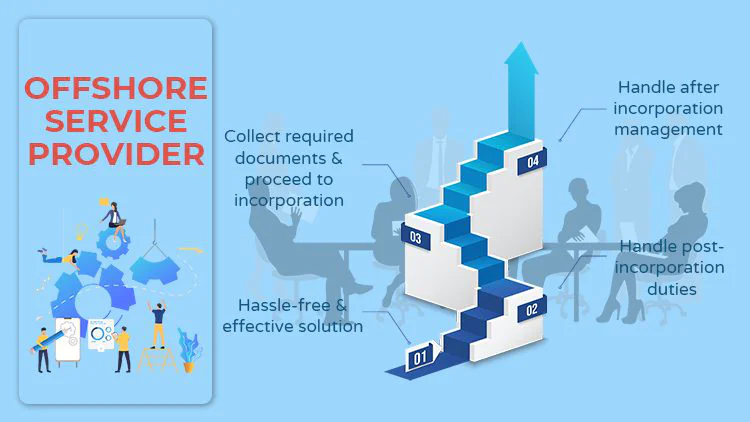Opening Worldwide Prospective: Professional Overview to the Formation of Offshore Companies
Opening Worldwide Prospective: Professional Overview to the Formation of Offshore Companies
Blog Article
Professional Offshore Business Administration
With globalization and the boosting relevance of international business, more business are checking out the advantages of establishing and handling overseas entities. In this conversation, we will certainly discover the benefits of overseas business monitoring, key factors to consider for overseas procedures, and reliable approaches to ensure compliance and reduce dangers.

Benefits of Offshore Company Management
There are several considerable advantages to overseas firm management that can substantially benefit companies looking for international expansion and financial optimization. Offshore jurisdictions often provide positive tax obligation regimes, including lower or no business tax obligations, lowered capital gains taxes, and exemptions from particular taxes on returns and passion.
Offshore firm administration allows organizations to maintain a greater level of privacy and discretion in their monetary affairs. Offshore territories usually have stringent laws and laws in location to protect the identification of business proprietors and shareholders, making it difficult for 3rd parties to accessibility sensitive details.
Moreover, offshore company administration offers businesses the possibility to access a global market. By developing an offshore visibility, business can expand their reach and take advantage of brand-new markets without the requirement for significant physical facilities or establishment expenses. This flexibility permits businesses to quickly adjust to altering market problems and benefit from brand-new growth chances.
Trick Considerations for Offshore Operations
When involving in offshore business monitoring is the mindful consideration of vital factors for successful overseas procedures,One essential element to ponder. These considerations play a crucial duty in making certain the smooth performance and productivity of the overseas venture. Firstly, it is necessary to analyze the political and financial stability of the overseas territory. Investing in a financially prosperous and politically secure jurisdiction reduces the risk of abrupt plan adjustments or financial declines that could adversely influence the business. Additionally, understanding the legal structure and regulatory atmosphere of the offshore jurisdiction is important. Different territories have differing degrees of regulatory demands and compliance standards. It is critical to ensure that the chosen jurisdiction straightens with the company's objectives and goals. Another key consideration is the accessibility of a proficient and reputable workforce. Offshore operations need an experienced labor force that can efficiently take care of the daily procedures and add to the growth of business. The facilities and technological abilities of the offshore territory ought to be examined. Ample framework and accessibility to advanced innovation are important for reliable operations. Last but not least, considering the tax ramifications and rewards offered by the overseas jurisdiction is vital. A beneficial tax regimen can give considerable cost financial savings and boost the general productivity of the overseas endeavor. By carefully taking into consideration these crucial elements, companies can enhance their offshore operations and accomplish long-term success.
Making Sure Compliance With Local Laws
To make certain conformity with local guidelines, companies taking part in overseas procedures should extensively comprehend and adhere to the details lawful demands and regulative framework of the overseas territory. Offshore jurisdictions commonly have their very own set of laws and regulations that control different elements of company operations, including firm formation, taxes, work, and economic reporting. It is vital for business to familiarize themselves with these guidelines to avoid potential legal concerns and fines.
One of the primary steps in ensuring conformity is performing thorough research study on the regulative and legal landscape of the selected overseas jurisdiction - formation of offshore companies. This involves examining the local regulation, comprehending the needs for business enrollment and licensing, and identifying any kind of certain policies that might apply to the company's industry or service tasks

When the legal demands are understood, firms must take aggressive actions to follow them. This consists of acquiring the required licenses, licenses, and approvals prior to beginning procedures, and ensuring recurring conformity with tax obligation and reporting responsibilities. It is likewise important to remain upgraded with any type of amendments or changes to the laws in order to stay compliant.
To facilitate compliance, firms may take into consideration involving the solutions of regional legal and bookkeeping experts who are fluent in the offshore territory's regulations. These specialists can offer advice and help in navigating the complicated lawful landscape, helping firms to avoid conformity pitfalls and make certain smooth operations.
Tax Obligation Planning Methods for Offshore Companies
Reliable tax obligation planning is crucial for offshore organizations to enhance their tax obligation obligations and optimize their financial performance. Offshore services commonly have the advantage of going through desirable tax regimens, which can substantially reduce their tax worry. Nonetheless, to fully gain from these advantages, it is critical to establish reliable tax preparation strategies.
One common tax preparation approach for overseas businesses is utilizing tax treaties. These treaties are contracts between countries that aim to stop dual tax and supply tax obligation alleviation for businesses running in numerous territories (formation of offshore companies). By benefiting from these treaties, overseas organizations can decrease their tax obligation responsibilities and make certain that they are not paying tax obligations on the very same revenue in numerous nations
An additional method is setting up a tax-efficient business structure. This involves establishing a holding company in a tax-friendly territory and structuring the organization procedures in a means that lessens tax obligation responsibilities. By very carefully preparing the ownership and control of the offshore firm, it is feasible to decrease tax obligations on earnings, returns, and funding gains.
Furthermore, overseas services can engage in transfer pricing approaches to enhance their tax placement. Transfer rates includes establishing the prices at which goods, services, and intellectual home are moved in between related entities within the same multinational group. By setting transfer rates at an optimum level, overseas services can designate revenues to low-tax jurisdictions, reducing their total tax obligation responsibility.
Lessening Dangers in Offshore Workflow
Offshore companies have to prioritize minimizing dangers in their operations to make sure long-lasting success and financial stability. Operating in an offshore territory presents one-of-a-kind challenges and uncertainties that need cautious monitoring. get more To successfully minimize risks, offshore organizations need to adopt a proactive method by executing robust danger management methods.
One trick facet of danger reduction is conducting extensive due diligence before involving in any kind of overseas purchases or collaborations. This entails researching and verifying the reputation, monetary security, and lawful conformity of prospective business partners or company. By thoroughly vetting these entities, offshore companies can lower the risk of fraudulent tasks or organization with illicit operations.
Moreover, offshore companies must implement thorough internal control systems to find and avoid any kind of possible illegal tasks within the organization. This consists of establishing clear policies and procedures, segregation of responsibilities, normal tracking, and inner audits. By keeping a durable inner control framework, overseas organizations can reduce the websites threat of internal fraudulence and unauthorized tasks.
In addition, overseas services need to focus on compliance with international guidelines and anti-money laundering (AML) measures. Staying updated with progressing regulatory demands and executing effective AML procedures can minimize the threat of legal consequences and reputational damage.
Finally, offshore services should consider getting suitable insurance protection to secure next page versus unpredicted occasions such as all-natural disasters, political instability, or legal conflicts. Insurance plan tailored to offshore procedures can provide monetary compensation and assistance throughout times of situation, making certain the connection of organization tasks.

Conclusion
Finally, overseas company administration uses numerous benefits such as tax obligation preparation strategies, decreasing threats, and making certain compliance with regional policies. It is crucial for services to very carefully consider vital factors for offshore procedures and browse the intricacies of various jurisdictions. By applying efficient administration approaches and remaining current with regional regulations, businesses can successfully run offshore and profit of global service chances.
In this conversation, we will certainly explore the benefits of offshore firm administration, essential factors to consider for offshore procedures, and efficient strategies to make certain compliance and reduce risks.One crucial facet to consider when engaging in overseas firm administration is the cautious consideration of vital elements for effective offshore procedures.To guarantee conformity with local guidelines, companies engaging in offshore operations have to completely recognize and adhere to the particular lawful needs and regulatory structure of the overseas jurisdiction. Offshore jurisdictions typically have their own collection of regulations and policies that govern different facets of service operations, consisting of firm formation, taxation, work, and economic coverage. By applying efficient monitoring strategies and staying current with regional guidelines, organizations can successfully run offshore and gain the benefits of worldwide service possibilities.
Report this page